- Home
- Roger Smith
Dust Devils Page 2
Dust Devils Read online
Page 2
The boy was sniffling now too, so Dell freed his left hand and embraced his son. Holding the two of them. Back when he was working, when he was away from his family, lying alone in a hotel room or sitting in the darkened tube of a passenger jet, Dell had caught himself repeating the names of his wife and children in a silent mantra. As if that would keep them bound together in an unbreakable unit. Rosie, Mary, Tommy.
Tom was wriggling and Dell let him go. But Mary held on. "I love you, Daddy."
"And I love you too, my angel."
Finally his daughter's small fingers released him and Dell, still kneeling, lifted his face from her hair and saw the black pickup truck, a four-wheel drive with smoked windows and bull bars, coming up behind them. Fast. He watched it grow in the rear window, waiting for it to swing out and pass. It didn't.
The bull bars smashed into the trunk of the Volvo. The car yawed and Rosie fought to keep it on the road. The children screamed and Dell was shouting at the truck, as if that would stop it.
The black fender and fat nubby tire loomed up next to Rosie, who cursed in Afrikaans, fighting the wheel. She lost control when the truck rammed them from the side, edging the Volvo toward the skinny silver guardrail. The truck hit them again and the car leapt at the crash barrier, tearing free the short wooden uprights that tethered it to the edge.
The impact of the collision sent Dell, unrestrained by a seatbelt, through the windshield. He went out backwards, in an explosion of glass, like he'd been ejected. Hanging over empty space for what seemed like hours before he hit the earth, landing on his side, on the narrow strip of coarse grass that grew between the torn and twisted steel and the endless drop.
The last thing he saw before the world went black was the Volvo with everything he loved inside it, turning in the air, tumbling forever, as it fell toward the jagged rocks below.
Inja Mazibuko was hungry. He hadn't eaten since he'd shot the fat white man. His fast an attempt to starve the dark thing that ate his strength, and a penance to appease the ancestors, a plea to them to lead him to the woman who had escaped. The one who had seen his face. The half-breed. Now, watching her car smash into the rocks, exploding in a ball of dirty orange fire, he felt his appetite stirring.
The Xhosa idiot at his side laughed, pointing down at the car. "Yoh, yoh, yoh!" A braying donkey who never shut up.
Inja shoved the Toyota truck into gear and started down the pass toward distant Cape Town. He was a Zulu by birth, his home nearly two thousand miles away, up the East Coast, past Durban, where he was an induna, a headman, in the service of his chief. He'd flown in to kill the rich white man and he was anxious to leave, now he'd cleaned up the mess. He didn't like this place, full of half-breeds and Xhosa fools. Like the boy yapping at his side.
Inja had recruited the youth in Cape Town, one of the animals running wild in the shack settlements that festered around the city's airport. He didn't know the town and needed a local to guide him. He hadn't let the boy out of his sight for three days and he was growing weary of his empty-headed babbling. Inja tuned him out and thought of food. He was lusting after a sheep's head, the way it was cooked in the ghetto townships, his mouth heavy with saliva.
At the bottom of the pass the empty road flattened and ran straight toward a dam that lay like a mirror in the blackened veld. Inja slowed and turned off the asphalt, drove a little way up the gravel path that led to the dam wall.
"Why are we stopping, baba?" The idiot calling him father in deference to his greater age. He'd never shared with the boy his clan name. Definitely never shared the nickname that had haunted him since his childhood in Zululand. Inja. Dog.
"I need to pass water." He opened the door and stepped down. "Get me a Coke from the back." Inja, skinny and black as a stick of licorice, walked a few paces from the vehicle and stopped beside a tree trunk that lay singed and twisted in the ash.
While he pissed, Inja saw the boy open the flap of the camper shell and climb into the rear of the Toyota, on his hands and knees, rooting in the Coleman cooler. Inja shook himself and zipped. Opened his check sport jacket and took the pistol from the holster at his hip. Not the weapon he used to kill the white man. This was the one he'd given the boy to carry. Still unfired. He found the silencer in his pocket and screwed it on while he walked back to the truck. Nobody for miles, but better to be careful.
The Xhosa's fat buttocks bulged out toward him. "There's no Coke, baba. Only Pepsi."
Inja leaned in and placed the gun barrel against the base of the boy's skull, where the skin furrowed like the rear of a bull. Pulled the trigger twice. The fool slumped forward, his backside still in the air. Inja reached up a gray belted loafer and shoved the ass until the boy sprawled flat. Grabbed the tarp that lay on the metal bed of the truck and covered the body. He slammed the tailgate closed and locked the camper shell.
Then he took the intimate garment from his coat pocket, held it between thumb and forefinger. Regarded it. The panties that he had found in the white man's bedroom. Tiny, immodest. The underwear of a whore. If he caught his wives wearing something like this, he'd take a horsewhip to them.
Some people would say that he had tracked the colored slut via the e-mail correspondence – of a sexual nature – that he had found on the BlackBerry he'd taken from the fat man's apartment. But Inja knew better. Those panties, soaked with the half-breed's juices, had allowed the ancestors to guide him to her like she was carrying a homing beacon. To the house in the suburbs of Cape Town, where he had been ready to go in and finish her, before she and her family drove away in the silver car and presented him with a neater alternative.
Inja dropped the panties to the ground and used his loafer to cover them with ash. He didn't like them, coloreds. Impure people. Neither white nor black. But the unfaithful woman had got what she deserved. He slid behind the wheel of the Toyota and bumped out onto the blacktop.
Dell opened his eyes. A glare burned into his brain and his head hurt. Flashes of memory burst like grenades in his skull. The black truck. The Volvo smashing through the silver rail. His wife and children screaming as the car tumbled.
Jesus.
He looked to his right and saw the drop down to forever. Saw oily black smoke boiling from the tiny crumpled Volvo that lay on its roof, burning against the rocks and the ash.
Dell closed his eyes. Tried to rewind and erase the nightmare. Rosie, Mary, Tommy. Wings flapped and he opened his eyes as a bird landed. A Cape vulture with a bald head, hooked beak wobbling on a skinny pink neck, dusty wings like an undertaker's coat. Wrinkled gray talons scuffed through the ash toward Dell.
He sat up, shouted and waved an arm. His skin was patterned with blood and one sleeve of his shirt was torn away at the shoulder. The bird made a sound like an old man coughing and lifted off, suddenly graceful as it fell away into the void and found its wings.
As Dell shouted, blood bubbled from his mouth and fragments of shattered glass glittered like diamonds when he spat onto the sand between his feet. He saw his shoes were gone. And one sock.
Dell stood up and the world spun, nearly sending him over the edge. He heard an engine straining up the rise, in low gear. Staggered out into the road, waving a bloody arm. A small green Japanese car came straight at him. As it braked Dell saw a man driving, sun catching his freckled hands on the wheel. A woman sat beside the driver, her face blank with shock.
Then the car accelerated and veered around Dell, speeding away. Two blond children stared at him through the rear window as the car disappeared behind a shelf of torn rock. He was unsurprised. This was South Africa where good Samaritans were gunpointed at fake accident scenes.
Dell found his cell phone in his jeans. The glass face was cracked and when he tried to dial an emergency number the phone stayed mute. He dropped the useless thing back in his pocket and started to walk along the road that snaked down to the dry river. Down to his family. He didn't get far. The blacktop rose up and smacked him in the head.
Inja drove for an hour, t
oward Cape Town. He smoked a fat hand-rolled spliff, heavy with the potent weed of his home. Durban Poison. Famous the world over for its almost hallucinogenic power. Not a drug in his culture. A medicinal herb. The weed that had sent Zulu warriors into battle against the Boers and the British, eyes red with bloodlust.
Durban Poison grew green and profuse on the rocky red hills of Inja's home, and he had made a fortune out of it over the years. Using the locals to tend and harvest his illegal crop. Shipping it down to Durban for export. It was his first smoke of the day and he felt that familiar sense of his own strength. His own power and invincibility. A feeling he thought he had lost.
Inja was on the freeway into Cape Town, the flat-topped mountain in the distance, when he saw an exit leading to a gas station and a diner. His rumbling belly demanded he stop. It would be white man's food, tasteless and without nourishment, but it would hold him until he could get a sheep's head later.
Inja whistled as he left the freeway and parked the Toyota outside the diner. He walked in and took a seat in a booth by the window, with a view over the car park and the gas station. Ordered a double cheeseburger, fries and well-done eggs on the side.
His order came and he ignored the looks of the white and half-breed families as he shoveled food into his mouth. He waited for his stomach to rebel, his appetite to turn itself off like a faucet, leaving him sweating and sick, the curses of the ancestors bouncing off the bones of his skull. But the food stayed in his gut and the plate was nearly empty before he started to feel satisfied. Slowed down. Burped. His stomach swelling happily against his belt. The warmth in his belly spreading down to his testicles.
He reached into his pocket and removed his wallet, flipped it open to reveal the snapshot inside. A beautiful virgin from the Zululand hills, her bare breasts like buds. Sixteen years old. Inja would take her as his bride one week from today. His fourth wife. He stared at the photo as he chewed.
Inja heard a dog bark and looked across to the parking lot. A cop car had stopped next to his truck and two uniforms, one white, one half-breed, stepped out. The white cop let a police dog – a big thing on choke chain – out the rear. It led him to a patch of grass and drilled a stream of piss against a dead tree. The half-breed leaned his elbows on the roof of the car and lit a cigarette, watching a woman in tight jeans fight her way down into a convertible.
The white cop walked the dog back after it was done. It stopped at the tailgate of Inja's rental Toyota, its long snout sniffing. The uniform pulled at the dog's chain, but it wasn't to be moved. The white cop ran a hand over the tailgate, inspected his fingers, said something to the half-breed who flicked his smoke onto the pavement and joined his partner. The two men looked into the back of the truck. Tried the camper shell, found it locked.
The cops spoke to a pump attendant who pointed to where Inja sat in the window booth. They shut the dog in the car and walked into the diner, sidearms drawn, spooking the other customers, who ducked for cover beneath the tables.
Inja dipped one of the fries in ketchup, chewed on it, watching the cops approach, Z88 service pistols locked on him. "That your truck?" the half-breed asked. Inja nodded.
"Keep your hands where we can see them," the white cop said.
Inja looked at them, still chewing. Reached for the wallet, lying open on the table, their guns following him. He held up the wallet, so they could see his ID in the plastic window beside the photograph of his betrothed.
"Agent Moses Mazibuko," he said. "Special Investigation Unit."
Two bare-breasted Zulu girls appeared through the water grass, balancing large clay calabashes on their heads. Naked except for a fringe of colored beads around their waists and their calves, they crossed the rocks to the river, heads perfectly still on their undulating bodies.
The younger girl – the pretty one – lifted the calabash from her head and knelt down at the water to fill it, the sun catching her braided hair. And catching the white headphones that twisted from her ears, disappearing into the shiny iPod slipped into the waist of her pink and yellow beaded skirt.
Cameras clicked and whirred. A Dutch tourist, florid and sweating in shorts and a T-shirt, crouched as he focused his long lens on those pert young breasts. His wife, sunburned red as a wheel of gouda, looked away in disgust, fanning herself with a guidebook.
A big Zulu man, dressed in a loincloth and leopard skins, proudly bearing his beer gut before him, addressed the small knot of European tourists wilting under the African sun. The name plate Richard was pinned to his leopard-skin bib. "Ladies and gentlemen, siyabonga. I thank you. That is the end of our traditional Zulu village tour. Please to make your way back to the souvenir area by the bus."
The Dutchman walked backwards in his sandals and socks, still shooting the two girls who gathered up their calabashes and headed to the humpbacked reed huts visible above the grass.
"Girl! Come here!" Richard shouted in Zulu.
The pretty one, Sunday, turned and walked back toward where the guide stood alone now on the riverbank, hands on his fat hips. His birth name was Xolani, which foreign tongues could never wrap themselves around. So he had become Richard for the tourists, and the name had stuck.
Sunday kept her eyes downcast, as befitted a young maiden talking to a man of his years. When she reached him, she knelt in the sand, still not looking at him.
He yanked the headphones from her ears and they trailed in the dust. "Where do you get this?"
"I found it, baba," she said.
He held out a fleshy hand. The same hand that roamed like a rooting warthog over the bodies of the young girls in his charge. "Give it to me."
She slipped the iPod from her waist and handed it to him. He squinted at it, forehead furrowed beneath his crown of feathers, the iPod lying flat on his palm. He closed his fist and it disappeared. "Go now. I will deal with you later."
She bobbed her head and waited until he followed the tourists before she got to her feet and hurried off. The thing was dead anyway, stopped working a few days after she'd found it lying in the dust where a tour bus had parked. She hadn't known what it was, this flat little blue rectangle with no buttons, when she'd concealed it in her clothes and taken it to her aunt's hut. It had looked so clean and pretty. Like an artifact from a distant and better world.
She'd kept it hidden until the earnest young AIDS educator from Durban had come to the valley. The boy, Sipho, in his I'M POSITIVE T-shirt, was only a few years older than Sunday but he was from the city and could have come from another planet. He told her it was called an iPod. Had shown her how to use it. Laughed when she put the headphones in her ears and noisy white man's music thumped out.
Sipho told her that the battery inside would die unless it was charged on a computer. Where was she to find a computer? There was no electricity in her village, never mind a computer. She listened to a windup radio, hearing crackling Zulu choral music broadcast from Durban. On a good day, if the weather was kind, she might hear some African pop.
Sipho went away, leaving her with safe sex pamphlets in the English that she couldn't read and silver foil packages of condoms. Her aunt found the condoms and beat Sunday, even though the girl hadn't properly understood what they were used for.
The blue music player died, as Sipho said it would. But she had still worn it, as a kind of charm. Pretended she could hear music through the white headphones. A reminder of better things.
Sunday walked up to the circle of reed huts, built in the traditional Zulu style. Nobody lived here. These huts were part of a cultural village. Small buses from Durban arrived each day filled with pale-faced tourists who listened to Richard's version of Zulu history. Sunday and the other workers came from miles away, from the shacks that grew on the sides of the rocky hills in the rural ghetto.
Sunday ducked into the hut where she'd left her clothes. Felt her insides turn to liquid when she saw her aunt sitting on the dung floor, eating a packet of chips and waving away flies with her skinny hand. Sunday had prayed she w
ouldn't come. But here she was.
"You are late, Sonto." Calling her by her Zulu name, the name on her birth certificate. Her mother had always used the English, Sunday, and she'd held onto it. All she had left of her mother dead more than ten years.
"I'm sorry, Ma Beauty." As always, Sunday struggled to find a resemblance between this woman, dried-up as a tree root, and her sister, the angelic mother of her memory.
Sunday slipped out of the beaded skirt. Pulled on a white T-shirt and reached for her no-name-brand jeans hanging on a wire hanger stuck in a hole in the wall of the hut. Her aunt scratched in a bag and came out with the short gray pleated skirt Sunday had once worn to school. Before the flaking asbestos building with broken windows and a leaking roof had stood in the path of a veld fire and been eaten.
"Put this on," her aunt said. "It will make it easier for the inspector."
Sunday obeyed, tugged the skirt up over her narrow hips, smelling the smoke of another fire, long ago. Staring past the ugly woman, the air heavy with memories.
"Hey, girl, stop dreaming. Get a move on." Her aunt's voice pulling her back. "What is wrong with you?"
"Nothing, Ma."
The skinny woman scowled up at her. "You are broken, you?"
"No, Ma. I swear. I am not broken."
"You! If the inspector finds you are broken I will kill you, I swear!"
Sunday shook her head, slipped her feet into white tennis shoes without laces. She stood by the door, waiting for her aunt to rise.
"Where are the betrothal beads?"
Sunday forced back words of refusal and found the beaded necklace lying under her clothes: diamond shapes on a dark background. The sign that she belonged to a man. She hated it, hated the ugly old dog who had given it to her. Bought her with cattle. She wanted to break it, see the beads falling to the dung floor like blue and red rain. But she didn't. Hooked it around her neck, feeling like somebody's animal.

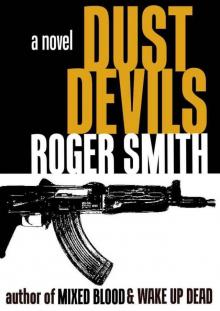 Dust Devils
Dust Devils![[2013] Sacrifices Read online](http://i1.bookreadfree.com/i/03/19/2013_sacrifices_preview.jpg) [2013] Sacrifices
[2013] Sacrifices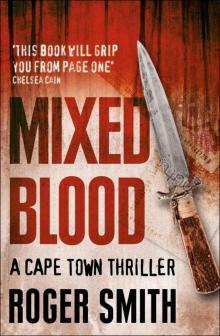 Mixed Blood
Mixed Blood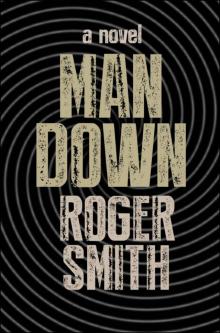 Man Down
Man Down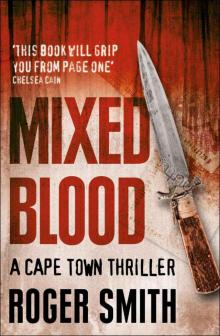 Mixed Blood ct-1
Mixed Blood ct-1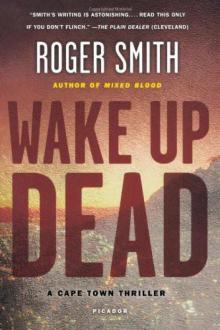 Wake Up Dead: A Thriller (Cape Town Thrillers)
Wake Up Dead: A Thriller (Cape Town Thrillers)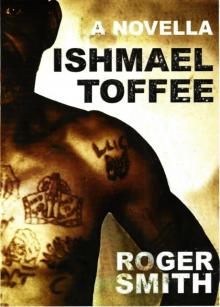 Ishmael Toffee
Ishmael Toffee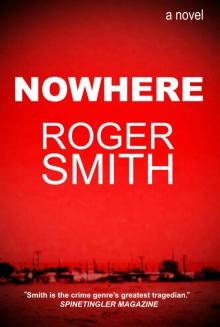 Nowhere
Nowhere Sacrifices
Sacrifices